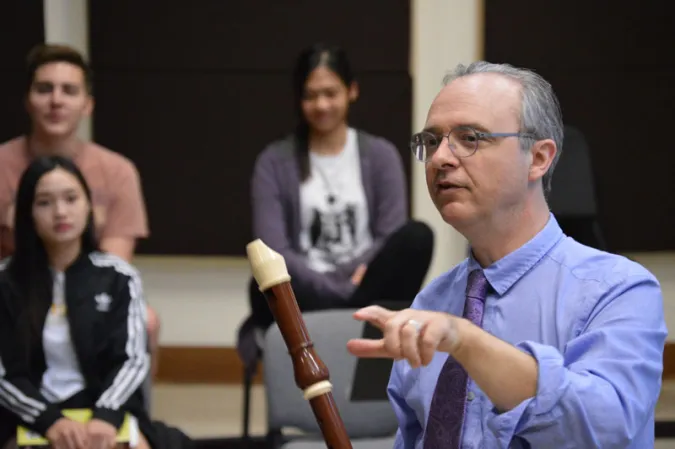New course expands horizons for first-year students in the Butler School of Music
By Andrew Dell’Antonio and Robin Moore

What does it mean to be an aspiring young professional musician in the year 2017? Last semester we pioneered a new course (MUS 312C – “Music and Culture”) designed to equip all first-year students in the Butler School of Music with the tools to understand and shape their role in contemporary life. Students discussed professional ethics and community engagement, experimented with multiple notation systems and the transcription of various world musical traditions and engaged in improvisation and choreographed movement. We also grappled with the way music and musicians create meaning among themselves and in society, in not only positive, but also sometimes troubling ways. We talked about politics and identity, about copyright and creativity, about privilege and opportunity, about colonialism and its impact on culture and about the ethics of many kinds of performance. We took creative risks with multiple forms of collaborative music-making, and we contemplated canon and curriculum—how institutions determine what music and training is important and who ultimately gets to decide such things? We thought about the many ways professional success can be defined and about the importance of giving back to one’s communities. Over and over we asked: So what? Why does music matter? How do we make our creativity meaningful to ourselves and to others? How can we do the most good in the world as artists and performers?
Our dynamic curriculum combined case studies from art and popular/commercial traditions and covered timeframes ranging from the early Middle Ages to the present day and geographical locations across the globe. Provost’s Teaching Fellow and Associate Professor Sonia Seeman originally envisioned the course. Because Dr. Seeman was on Fulbright leave this year, we (Professors Andrew Dell’Antonio and Robin Moore) further customized the course for this first go-around, with support from doctoral teaching assistants Sarah Lahasky and Joseph Ovalle. The multiple, overlapping, sometimes fruitfully conflicting personalities and perspectives of our teaching team made for an environment in which students could understand that knowledge is best built through respectful conversation, disagreement and sometimes even the humble admission of ignorance. Our teaching team was continuously energized by the welcome challenges of coordinating topics, perspectives and modes of presentation; we were all gratified by the energy that students invested in the substantial written work involved, and we were humbled by the insights they brought to the discussion of their artistic motivations and goals. We drew upon many guest presenters throughout the semester (visiting musicologists, performers and scholars from the Butler School faculty, instrumentalists with expertise in non-Western repertories, exchange students from abroad or with experience in other kinds of music programs), both in-person and remotely, and we are grateful to the generosity of our colleagues at UT and beyond for sharing their expertise and enthusiasm with the class.
The final substantial writing assignment undertaken by each student was an “auto-ethnography”—a multi-part examination of their own background, their reasons for studying music and their perspectives on the appropriate role of musicians in society based on material discussed in our course. In addition, we asked that they consider not only their future plans, but also what skills and perspectives they intended to nurture over the next three years at UT to empower themselves to achieve such goals. Reading 70 very different and equally thoughtful self-reflective essays made us optimistic about the future of music in the coming decades, confident that Butler School of Music students are prepared to create what’s next and grateful that we had the opportunity to facilitate a few of their significant steps along newly defined paths.
Andrew Dell’Antonio is a Professor of Musicology, Associate Dean for Undergraduate Studies and a member of the College of Fine Arts Diversity Committee. Robin Moore is Professor of Ethnomusicology in the Butler School of Music.
Photo credit: Andrew Dell'Antonio

